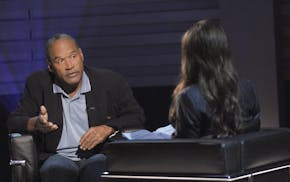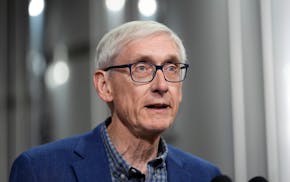There wasn't time last fall, after winning the National Book Award, for Will Alexander to celebrate. He and his wife had just had their second child, so now there was little Iris to look after as well as toddler Liam — diapers and preschool and midnight feedings and tag-team child care. It was November, so there were holidays to plan, and relatives coming to visit, and grades to get in for Alexander's classes at MCAD.
That is why Tuesday, when his second book is published, Alexander won't just hold a reading — he'll throw a party, a big one, with chocolate and wine and live music, and people will make masks, and Alexander might read a little, from one or maybe both of his books, because he does love to perform.
"It'll be both a launch party and a celebration," said Alexander, who lives in the Powderhorn neighborhood of Minneapolis and who is still a little dazzled at winning a National Book Award for his very first book — especially since, for a while, the book looked as though it might bomb.
At the Blue Ox coffee shop around the corner from where he lives, Alexander spends several hours most days at the end of the long wooden counter. This is where he writes, his laptop or composition book (he uses both) resting on the espresso bar. The bar was made by Minneapolis artist Heather Doyle out of tooled stainless steel, copper pipe and antique glass doorknobs, and it was meant to be a place for espresso lovers to gather and chat with the barista.
But it is the perfect for height for Alexander, who writes standing up, and he has taken it over (with the blessing of the baristas, as well as of Doyle, who says it's an honor). He calls it his steampunk writing desk.
Because of a spinal defect, Alexander can't sit for any length of time. A hairline fracture in one of his vertebrae grew worse over the years, and eventually the bones that held his spine together broke and separated. "At that point, my spine was only held together by muscle," he said. He had surgery in 2001, but the problems have since returned.
He cannot lift his toddler. He gave up the theater, his first love. And he writes, and reads, and talks, standing up. When asked if he's in constant pain, Alexander leaned on his cane, gave an oblique, wry look and responded: "He smiled politely and said nothing."
An orphan, a witch, a quest
Alexander is a slight man, soft-spoken yet fast-talking, with dark hair, a neatly trimmed beard and rather piercing dark eyes. He and his wife, Alice Dodge, came to the Twin Cities in 2006 so that Dodge could study at the Minneapolis College of Art and Design. Alexander worked selling books at Magers & Quinn, he wrote for Rain Taxi Review, and eventually he moved over to MCAD to teach.
"When we came here, I was completely ignorant about what an amazing art and literary community the Twin Cities has," he said. "I didn't expect this town would be so good to me — we moved here for her. But the local science fiction and fantasy community is amazing. The kid lit community is amazing. There are so many writers in this town!"
"Goblin Secrets," the book that won the big prize, had been rattling around in his head for a long time. As an undergraduate, Alexander studied theater and folklore at Oberlin College, and elements of both inform the story — goblins as masked mummers, plucky orphans, witches and a quest.
The story follows an orphan child named Rownie, who lives with a witch named Graba. Rownie's brother has vanished, so Rownie runs off with a troupe of goblin actors to find him, but Graba wants him back.
It is set in a place called Zombay, which seems, at first, a little like medieval London, with winding lanes and ramshackle houses and a bridge much like the London Bridge, with a clock tower and homes and shops built right over the water. But … some of the people of Zombay have gears for eyes. Others have mechanical arms and legs that must be wound and oiled. Coal is made from human hearts. And what's that swimming through the dust at Rownie's feet? A dustfish? What's that?
The strangeness of the setting and the populace — which are never explained — made the book tricky to sell. "Some people like to travel, and some don't," Alexander said. "Some people like to be dropped into a strange new world. Some don't."
The book was published in March 2012 "to a lot of very appreciative noise, and a lot of 'I don't know what to do with this,' " he said.
The trade journals disagreed: Kirkus Reviews called "Goblin Secrets" "wryly humorous" and "gripping and tantalizing." Publishers Weekly allowed that it had an "intriguing central theme" but said it was "stuffed with interesting ideas that don't quite have time to breathe."
"It was mostly passing unnoticed," Alexander said. "It looked at first like it might vanish without a trace."
Still, he had gotten the book into the hands of some of his heroes, and their reaction made all the difference to him. Fantasy author Jane Yolen loved it. Peter S. Beagle loved it. Ursula K. LeGuin blogged about it, calling it "endearing and haunting." She wrote, "I wish I'd read it when I was 11."
"That line gives me great comfort," Alexander said. "That happened fairly early, and that satisfied me. That was enough. That was absolutely enough."
But then came October, and Alexander's 36th birthday, and the phone call from the folks at the National Book Foundation.
A week in New York
Iris was just 2 weeks old when Alexander and his wife headed for New York in November for four days of celebration, bookstore visits and readings. "Nobody knew who the winners would be — it hadn't actually been decided yet," he said. "The whole vibe, the camaraderie of it, felt not at all competitive. We were all thrilled to be there."
He tried not to feel unworthy. The other finalists in young people's literature had written "some really heart-wrenchingly beautiful material, and here I am, writing about goblins.
"I did prepare a speech. I thought of it like being an understudy."
When his name was called he made his way, leaning on his cane, to the podium, only to find that his speech was still in his wife's purse.
The aftereffects of winning have been modest but important. His book didn't bomb, but became a bestseller. His publisher decided to release an audiobook, and Alexander, ever the actor, wondered if he could record it himself. He sent a recording of himself reading in an old northeast Minneapolis movie theater, and it got him the job.
His second book, "Ghoulish Song" (which also takes place in Zombay), was already finished, and he was deep into his third book, "Ambassador" (a sci-fi book set in the Twin Cities and Outer Space). "So the feeling of 'How do I follow this up?' wasn't a factor," he said.
"I'm writing the books that I want to write. I'm actually going to get paid to write them. There's a sense of stability. There's also more pressure: These books should not suck.
"The show is the same. The audience just got bigger."
Laurie Hertzel • 612-673-7302 on Twitter @StribBooks
West Virginia transgender sports ban discriminates against teen athlete, appeals court says
Dr. Martens shares plunge to record low after weak US revenue outlook
Visa fees for international artists to tour in the US shot up 250% in April. It could be devastating

Executor of O.J. Simpson's estate plans to fight payout to the families of Brown and Goldman
